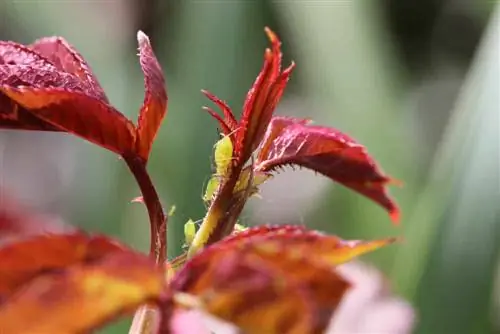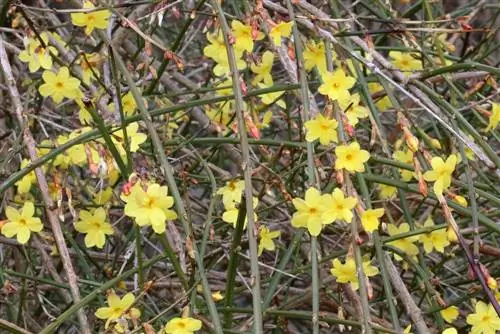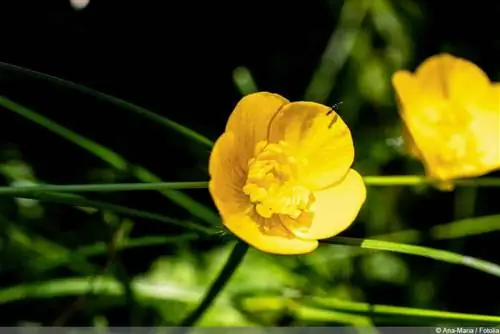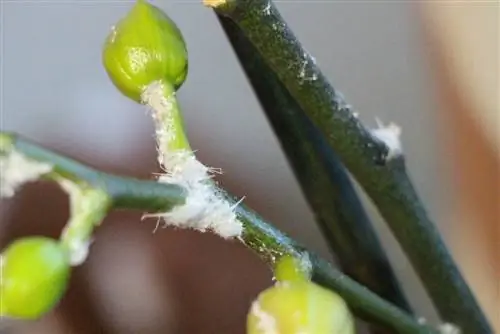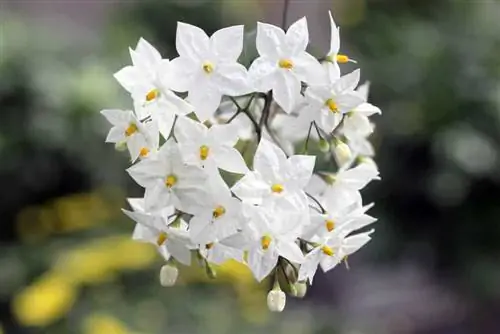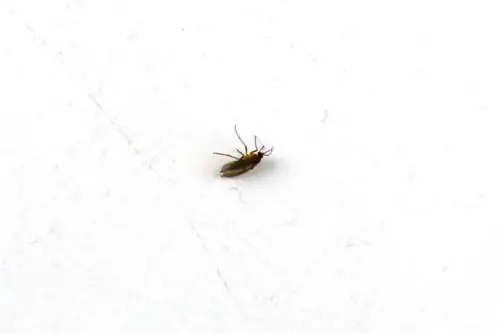- Author admin caroline@plants-knowledge.com.
- Public 2023-12-17 03:39.
- Last modified 2025-01-24 12:45.
Aphids cause significant damage to plants by sucking the sap from the leaves. It is particularly annoying when they attack decorative plants such as lavender or jasmine. Fortunately, it is possible to combat the pests with simple, environmentally friendly home remedies.
Identifying aphids
As the environmental awareness of most hobby gardeners increases, more and more home remedies are becoming known that help against plant pests. The possibilities are immense, but not every means achieves success. In order to be effective, it must be tailored to the type of pest infestation. Accurate identification of the lice on jasmine or lavender is therefore a prerequisite for successful treatment.
Appearance of the lice
- Infestation is most likely in spring during the budding period
- 1 to 2 mm lice
- Body color: white, green, red, yellow or black
- capable of flight depending on species
- Accumulations on the plant stems and undersides of leaves
- simultaneous ant infestation (live in symbiosis with the pests)
Tip:
Both lavender and aphids are bursting with species diversity. Each type of pest is specialized for a specific type of lavender. There is therefore no need to fear that the pest will spread to other species. Black aphids usually settle on jasmine.
Damage to the plant
- sticky film on the leaves (star sooty mold)
- rolled leaves
- discolored leaves
- dried leaves
- Leaf loss
- Death of the plant
Note:
In the worst case, aphids transmit the dangerous tobacco mosaic virus or the Scharka virus.
Causes of the infestation
There are various reasons for aphid infestation. Only those who know the causes can fix them.
Weakened defenses
Many plants manage to fend off minor pest infestations on their own. However, the prerequisite for this is that the plant is vital and he althy. The correct conditions of the location play an important role in this regard. Too few nutrients, rainfall or drought weaken a plant's immune system. Jasmine and lavender thrive in sunny, warm places. They only require a few nutrients. Over-fertilization therefore promotes aphid infestation.
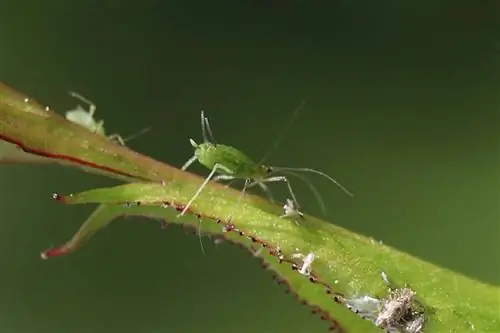
If the conditions are right, another pest could be the cause of a weakened defense system in the plant. In addition to aphids, the green louse also likes to visit ornamental plants such as lavender or jasmine.
Unsuitable location conditions
Not only the location, but also the planting decide whether a plant feels comfortable in the garden. Too dense growth deprives small lavender species of sunlight. In addition, the air cannot circulate sufficiently. Lice feel comfortable under these conditions.
Care errors
As already mentioned, excessive fertilizer application and little irrigation water are common causes of an infestation.
Note:
Pests are attracted to the color green. For this reason, even fragrant herbs as intermediate planting only provide limited protection against infestation.
Fighting pests with home remedies
It doesn't always have to be chemicals, you can also do a lot against aphids with home remedies.
Easy showering
If there is a light infestation, it is enough to rinse the pests off. Fortunately, both lavender plants and jasmine bushes can tolerate a strong stream of water.
Tip:
If you remove wilted flowers and dry leaves immediately, you can prevent an infestation.
Vegetable oil
Vegetable oil is an inexpensive home remedy that is available in almost every household. Since it is a pure food, it is also ecological and harmless. Suitable are, for example,
- Rapeseed oil
- Neem oil
To create a sprayable solution, water and oil must be combined with an emulsifier (e.g. dishwashing liquid).
Tip:
The best time to treat an infected plant with vegetable oil is winter. During the cold season, the larvae rest their eggs on the leaves and in the substrate. The oil covers the brood with a sticky film under which the pests suffocate after hatching.
Make plant manure/broth
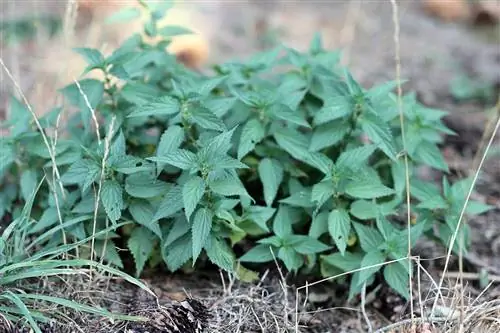
Manure or a decoction made from meadow plants and herbs are just as natural and environmentally friendly. Most of the time, the useful plants grow in the home garden or along the side of the road, where gardeners can pick them as needed.
Suitable are, for example,
- Stinging nettles
- Field horsetail
- garlic
- Fernwort
The collected plants are chopped up and placed in a large bucket of water, where they ferment in a warm location for several days. Manure and brew have the same effect, although the latter has a more neutral odor.
Tip:
Plant manure not only helps against lice, but also provides the plants with valuable nutrients as fertilizer. This advantage also makes it necessary to adapt the dosage to the needs of the plant. Weak eaters should not receive too much manure.
Homemade sprays
If no wild plants can be found, simple household or food products can also serve as a basis for a self-made spray:
- Milk
- soft soap
- Black Tea
- Coffee grounds
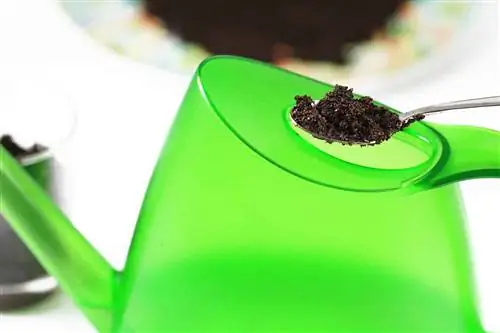
Sometimes the gardener even saves having to dispose of avoidable waste in this way.
Potato water
Potato water also doesn't belong in the sink. It is much better to use irrigation water to combat aphids.
Soda
Baking soda is one of the classic home remedies and also helps with aphid infestation. It is important that it really is baking soda. Conventional baking powder sachets often lack the effective sodium hydrogen carbonate.
Vinegar
It is hardly surprising that vinegar also appears in the list of control agents, as it is used almost everywhere in the household. Recommended are
- Spirit vinegar
- Apple Cider Vinegar
A concentrated essence, however, is unsuitable.
Tip:
Gardeners should only treat their plants with acidic home remedies such as vinegar in the early morning or late evening hours. The leaves threaten to burn in the midday sun.
Beneficial insects against aphids
As annoying as aphids may be, the pests also have an important function in the ecosystem. For example, they serve as food for numerous beneficial insects. Attracting
- Ladybug
- Parasitic wasps
- Earworms
- lacewings
- Gall midges
saves the gardener the use of pesticides or other labor required to produce the above-mentioned home remedies. If you are unable to attract the insects to your garden, you can order small bags from specialist retailers or online in which the brood of beneficial insects is offered as needed. When using it, however, it should be noted that the location conditions of jasmine and lavender correspond to the requirements of pest controllers.
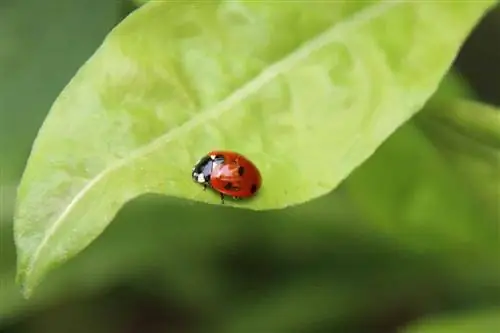
Tip:
Sometimes it's worth relying entirely on nature to fight it. On the one hand, the lice's mere appearance attracts beneficial insects that naturally reduce the population. On the other hand, the spit lavender, for example, exudes a scent that the pests cannot stand.

